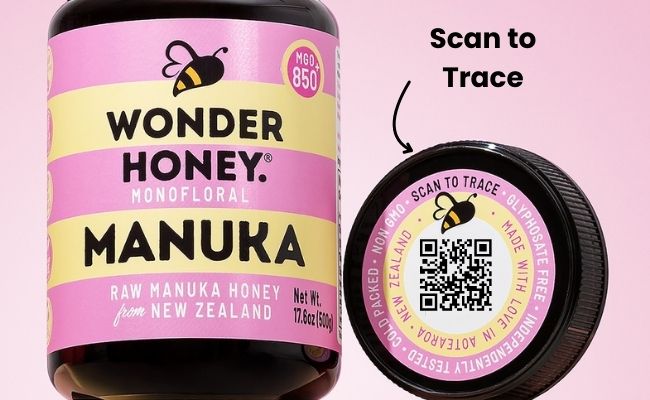
Vitamins and Minerals in Manuka
Vitamins and minerals play a vital role in your overall health, and manuka honey is an exceptional source of these important nutrients. Packed with beneficial compounds, it offers antioxidants, anti-inflammatory properties, and trace elements like zinc and iron, which can enhance your well-being. While it can provide numerous health benefits, be cautious of its high sugar content which may affect your health if consumed excessively. In this blog post, you will explore the remarkable vitamins and minerals found in manuka honey and how they can positively impact your health.
Key Takeaways:
- Vitamins: Manuka honey contains various vitamins such as B vitamins and vitamin C, which contribute to overall health and wellbeing.
- Minerals: This honey is rich in crucial minerals, including calcium, magnesium, and potassium, which support bodily functions.
- Antioxidants: Manuka honey is packed with antioxidants that help combat oxidative stress and promote cellular health.
- Antibacterial Properties: The unique compounds in Manuka honey provide robust antibacterial effects, enhancing immune support.
- Natural Energy Source: With its natural sugars, Manuka honey serves as a healthy energy booster, making it ideal for active lifestyles.
Overview of Manuka Honey
As a unique and sought-after natural product, Manuka honey has gained popularity due to its distinct composition and health benefits. Sourced from the nectar of the Manuka tree in New Zealand, this honey is renowned for its antibacterial properties and is often used as a natural remedy.
What is Manuka Honey?
Against the backdrop of traditional honey, Manuka honey stands out due to its unique antibacterial properties. This honey is derived from the flowers of the Manuka tree, which is native to New Zealand, making it a product of both nature and cultural heritage. You can find this honey in various forms, ranging from raw to infused varieties, each boasting its own set of beneficial attributes.
Unique Properties of Manuka Honey
What differentiates Manuka honey from other honey types is its high concentration of methylglyoxal (MGO), an active compound celebrated for its potent antibacterial effects. This honey also features a low moisture content and specific enzymes that contribute to its overall natural preservatives. You’ll appreciate how the unique components of Manuka honey not only aid in healing but also enhance your overall well-being.
At the core of its appeal, Manuka honey presents strong antibacterial qualities that can support your immune system and promote skin health. Its antioxidant properties help combat oxidative stress, making it a valuable addition to your wellness routine. You should also note that while Manuka honey is generally safe, it is important to choose high-grade products to ensure you reap the maximum benefits safely. The unique taste and nutritional profile found in Manuka honey can significantly contribute to your overall health.
Vitamins Present in Manuka Honey
Some of the notable vitamins found in Manuka honey include Vitamin B2 (riboflavin), Vitamin B3 (niacin), Vitamin B5 (pantothenic acid), and Vitamin C. These vitamins contribute to overall health, aiding in energy metabolism, reducing fatigue, and supporting the immune system. Manuka honey's unique properties, coupled with these vitamins, make it a beneficial addition to your diet.
Essential Vitamins
Behind the sweet and distinctive flavor of Manuka honey lies a wealth of crucial vitamins. Each of these vitamins plays a vital role in maintaining various bodily functions, helping you to enhance your overall well-being.
Health Benefits of Vitamins
Vitamins in Manuka honey provide numerous health benefits that are crucial for maintaining your vitality. They help in boosting your immune system, promoting energy production, and promoting skin health. Regular consumption of these vitamins can contribute to your body's ability to fight off infections and support general health.
Another key advantage of these vitamins is their role in facilitating wound healing. Vitamin C, in particular, is well-known for its contribution to collagen production, which is necessary for repairing tissues. Additionally, the presence of B vitamins can enhance metabolism, offering benefits like improved mental clarity and reduced feelings of fatigue, ensuring that you feel your best throughout the day.
Minerals Found in Manuka Honey
Not only is Manuka honey renowned for its unique flavor and antibacterial properties, but it also contains a variety of minerals that contribute to its overall health benefits. You can learn more about the nutraceutical values of natural honey and its contribution to health here. These minerals play a vital role in promoting well-being and enhancing your diet.
Key Minerals
Any discussion about the minerals in Manuka honey should include significant elements such as calcium, magnesium, potassium, and zinc. These minerals are imperative for various physiological functions and contribute to your overall health.
Role of Minerals in Health
Role of minerals in your health cannot be overstated, as they support numerous bodily functions. At the cellular level, minerals like calcium strengthen bones, while magnesium aids in muscle function. Additionally, potassium is important for maintaining healthy blood pressure, and zinc boosts your immune system. Understanding the importance of these minerals can help you make informed choices about incorporating Manuka honey into your diet, promoting optimal health and well-being.
Nutritional Comparison
Your understanding of the nutritional value of Manuka honey can help you make informed choices about its health benefits. The table below summarizes the vitamins and minerals found in Manuka honey compared to regular honey. For more insights, check out the Top 10 health benefits of manuka honey.
| Component | Manuka Honey |
|---|---|
| Vitamin B2 | Present |
| Vitamin C | Low |
| Potassium | Trace |
| Calcium | Trace |
| Magnesium | Trace |
Manuka Honey vs. Other Honey Types
Manuka honey stands out when compared to other honey types due to its unique properties and nutritional profile. The table below highlights key differences:
| Honey Type | Unique Features |
|---|---|
| Manuka Honey | High in antibacterial activity |
| Regular Honey | Sweetener, lower antibacterial properties |
| Wildflower Honey | Diverse floral sources, variable flavor |
| Clover Honey | Light taste, common in North America |
| Eucalyptus Honey | Strong flavor, soothing properties |
- High antibacterial activity
- Unique nutritional profile
- Variety in flavors
- Health benefits
- Not all honey is equal
The differences in potency and health benefits make Manuka honey a sought-after choice.
Impact on Dietary Needs
Impact on your dietary needs can vary greatly depending on the honey you choose. While Manuka honey is rich in natural sugars, it also offers potential health benefits that can complement a balanced diet. Consuming it in moderation can support your health while fulfilling your sweet cravings.
For instance, using Manuka honey as a natural sweetener can enhance your meals without the need for refined sugars. Its antimicrobial properties may also support your immune system, providing a unique addition to your wellness routine. However, be cautious of its calorie content if you are watching your weight, as overconsumption can lead to unwanted calorie intake. The benefits of incorporating Manuka honey into your diet can be significant, making it a valuable addition for enhancing overall well-being.
Therapeutic Uses of Manuka Honey
After extensive research, the therapeutic uses of Manuka honey have gained significant attention due to its unique properties. This natural remedy offers an array of health benefits, including enhancing wound healing, soothing sore throats, and providing relief from digestive issues. Incorporating Manuka honey into your wellness routine can promote overall health and aid in the prevention of various ailments.
Antimicrobial Properties
At the core of Manuka honey’s therapeutic efficacy are its potent antimicrobial properties. Research shows that it can inhibit the growth of various bacteria, including strains resistant to antibiotics. This makes it an excellent addition to your medicine cabinet, especially for treating minor cuts and infections.
Healing Properties
Manuka honey is renowned for its exceptional healing properties, especially when it comes to wounds and skin irritation. To maximize these benefits, apply a thin layer of Manuka honey directly onto affected areas, as it can promote tissue regeneration and reduce inflammation. Studies have demonstrated that this natural product stimulates healing in chronic wounds while providing a protective barrier against infection. Utilizing Manuka honey in your wound care routine can significantly enhance recovery and improve skin health.
How to Incorporate Manuka Honey into Your Diet
Unlike regular honey, Manuka honey boasts unique properties that make it a delightful addition to your diet. You can easily incorporate it by drizzling it over oatmeal, adding it to smoothies, or using it as a natural sweetener in herbal teas. It’s also a fantastic ingredient for dressings and marinades, enhancing both nutrition and flavor. Experimenting with different recipes will allow you to enjoy the benefits of Manuka honey while pleasing your palate.
Serving Suggestions
The versatility of Manuka honey lends itself well to various serving options. You can enjoy it on toast, combined with nut butter, or blended with yogurt for a nutritious snack. Additionally, consider using it in baking or as a natural sweetener for your favorite recipes, ensuring you reap its health benefits effortlessly.
Recommended Dosage
Around one to two teaspoons of Manuka honey daily is typically recommended to reap its health benefits. Incorporating this into your routine can boost your overall wellness.
Suggestions on dosage can vary based on individual health needs, but typically, one to two teaspoons daily is safe for most people. If you’re looking for daily energy boosts, consider consuming a teaspoon in the morning. On the other hand, if you are seeking its therapeutic benefits, especially for gastrointestinal issues or sore throats, two teaspoons might be more effective. As your health and body respond differently, start with a small amount and adjust as necessary; always consult healthcare professionals if needed.
Final Words
As a reminder, incorporating Manuka honey into your diet offers you not only a delicious taste but also a wealth of vitamins and minerals that can enhance your overall health. You can benefit from its unique properties, which include antioxidants, vitamins, and imperative minerals that promote wellness. Whether you enjoy it in recipes or take it straight from the jar, Manuka honey can serve as a natural supplement to support your nutritional needs.
FAQ: All About the Vitamins and Minerals in Manuka Honey
Q1: What vitamins are predominantly found in Manuka honey?
A: Manuka honey contains several vitamins, including B vitamins such as B1 (thiamine), B2 (riboflavin), B3 (niacin), B5 (pantothenic acid), and B6 (pyridoxine). These vitamins play vital roles in energy metabolism and maintaining overall health. Additionally, Vitamin C is present in smaller amounts, which contributes to immune function and skin health.
Q2: How do the minerals in Manuka honey benefit the body?
A: Manuka honey contains important minerals such as calcium, magnesium, potassium, and sodium. These minerals support various bodily functions: calcium is vital for bone health, magnesium plays a role in muscle and nerve function, potassium helps maintain electrolyte balance, and sodium supports fluid regulation in the body. The combination of these minerals can contribute to overall wellness.
Q3: Is Manuka honey a good source of antioxidants?
A: Yes, Manuka honey is rich in antioxidants, which help to protect the body from oxidative stress and free radical damage. Antioxidants present in Manuka honey, such as phenolic compounds and flavonoids, can contribute to reducing inflammation and enhancing the immune response, offering an additional health benefit.
Q4: How does the nutrient content of Manuka honey compare to regular honey?
A: While all types of honey contain some vitamins and minerals, Manuka honey is often noted for its higher levels of specific nutrients, particularly due to its unique activity and compounds derived from the Manuka plant (Leptospermum scoparium). It has greater concentrations of methylglyoxal (MGO) and dihydroxyacetone (DHA), which are believed to contribute to its distinctive health benefits compared to regular honey.
Q5: Can I substitute Manuka honey for other sweeteners to obtain these nutrients?
A: While Manuka honey does offer additional vitamins, minerals, and unique health properties, it is still a form of sugar and should be consumed in moderation. Substituting Manuka honey for refined sugars can provide extra nutrients, but to reap the full benefits, it’s advisable to incorporate it as part of a balanced diet along with other nutrient-rich foods.







Leave a comment
This site is protected by hCaptcha and the hCaptcha Privacy Policy and Terms of Service apply.